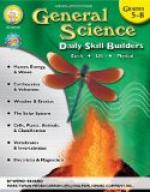The principle just stated embodies one of the fundamental laws of science, called the law of the conservation of matter.
A similar law holds for energy as well. We can transform electric energy into the motion of trolley cars, or we can make use of the energy of streams to turn the wheels of our mills, but in all these cases we are transforming, not creating, energy.
When a ball is fired from a rifle, most of the energy of the gunpowder is utilized in motion, but some is dissipated in producing a flash and a report, and in heat. The energy of the gunpowder has been scattered, but the sum of the various forms of energy is equal to the energy originally stored away in the powder. The better the gun is, the less will be the energy dissipated in smoke and heat and noise.
CHAPTER V
FOOD
55. The Body as a Machine. Wholesome food and fresh air are necessary for a healthy body. Many housewives, through ignorance, supply to their hard-working husbands and their growing sons and daughters food which satisfies the appetite, but which does not give to the body the elements needed for daily work and growth. Some foods, such as lettuce, cucumbers, and watermelons, make proper and satisfactory changes in diet, but are not strength giving. Other foods, like peas and beans, not only satisfy the appetite, but supply to the body abundant nourishment. Many immigrants live cheaply and well with beans and bread as their main diet.
It is of vital importance that the relative value of different foods as heat producers be known definitely; and just as the yard measures length and the pound measures weight the calorie is used to measure the amount of heat which a food is capable of furnishing to the body. Our bodies are human machines, and, like all other machines, require fuel for their maintenance. The fuel supplied to an engine is not all available for pulling the cars; a large portion of the fuel is lost in smoke, and another portion is wasted as ashes. So it is with the fuel that runs the body. The food we eat is not all available for nourishment, much of it being as useless to us as are smoke and ashes to an engine. The best foods are those which do the most for us with the least possible waste.
56. Fuel Value. By fuel value is meant the capacity foods have for yielding heat to the body. The fuel value of the foods we eat daily is so important a factor in life that physicians, dietitians, nurses, and those having the care of institutional cooking acquaint themselves with the relative fuel values of practically all of the important food substances. The life or death of a patient may be determined by the patient’s diet, and the working and earning capacity of a father depends largely upon his prosaic three meals. An ounce of fat, whether it is the fat of meat or the fat of olive oil or the fat of any other food, produces in the body two and a quarter times as much heat as an ounce of starch. Of the vegetables, beans provide the greatest nourishment at the least cost, and to a large extent may be substituted for meat. It is not uncommon to find an outdoor laborer consuming one pound of beans per day, and taking meat only on “high days and holidays.”




